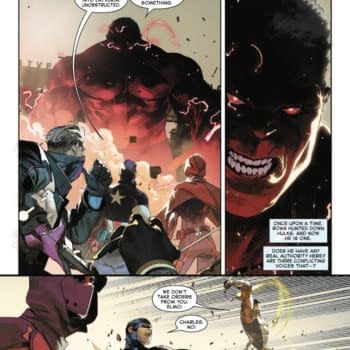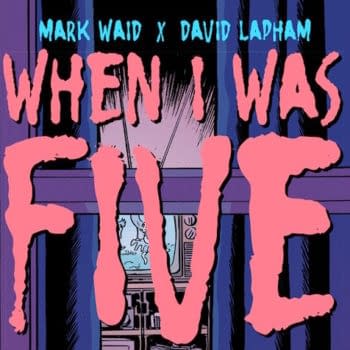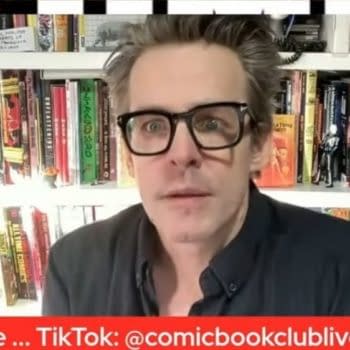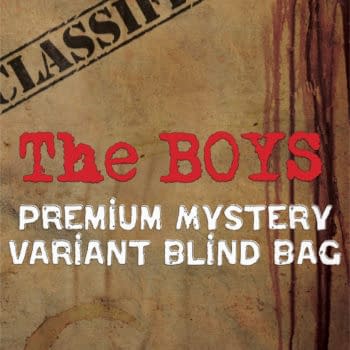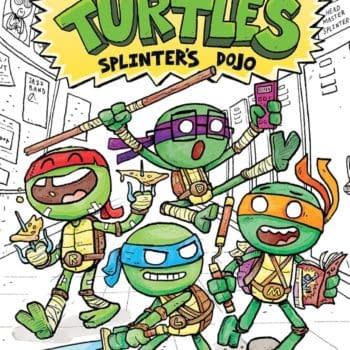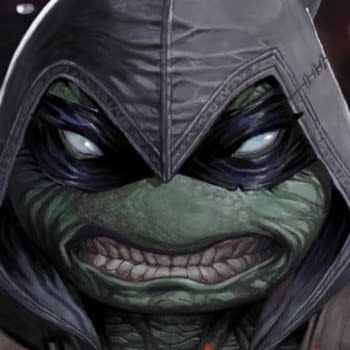Posted in: Comics, Recent Updates | Tagged: Art Spiegelman, avatar press, caanan white, Comics, entertainment, extinction parade, Legendary Entertainment, Marjane Sartrapi, Maus, max brooks, persepolis, The Harlem Hellfighters, vampires, zombies
Do Vampires Have What It Takes To Win A War? Talking With Max Brooks About The Next 'Act' Of The Extinction Parade
T
As Brooks reveals in this interview with Bleeding Cool, he's a careful scripter, planning out each arc well ahead of time, so the story is poised in evolve at a carefully chosen pace. Readers are soon to be introduced to the whole concept of what war might mean in a world where a vampire elite are being threatened by the sheer force of a massive, spreading population of zombies threatening their status in the food-chain by removing their prey from the equation step by step.
For Brooks, the ideas in The Extinction Parade all have real-world ramifications as modern human beings lose their survival skills and become heavily dependent on assumptions that may not always be true–like our own status as a dominant species. Add to that our own human tendency to provoke apocalypses and we have the mix of observations that led a horror/sci-fi writer like Brooks to create The Extinction Parade to explore some of these frightening possibilities on a fictional canvas.
Max Brooks speaks with us here at Bleeding Cool about his own brand of geekdom, writing across mediums, and exactly what his grand plans are behind The Extinction Parade: War, accompanied by artwork from the upcoming arc.
Hannah Means-Shannon: You spend a lot of time with zombies. What do you think the core characteristics of a zombie are and what frightens you about them? Why do you think they are such a matter of public fascination right now?
Max Brooks: I'm not sure I can speak with any confidence about public fascination. Maybe it has to do with the global anxiety we're all feeling about right now. Maybe it's because we feel the system is breaking down. I'm not sure. What I am sure about is what scares ME about zombies. I'm terrified of their relentlessness, their inhumanity, their numbers and scope and universality of their reach. They're more like a plague or a natural disaster than a traditional predatory monster. The conventional rules of monsters just don't apply. We're talking about a carnivorous, self-replicating force of nature. How could that not scare me?
HMS: What's with the current zeitgeist of apocalypse films, comics, TV shows, novels? Have you always been interested by apocalypse narratives, or has pop culture influenced you to consider that type of narrative more closely?
MB: Again, I can't speak about pop culture (if I could, they wouldn't have fired me from Saturday Night Live), but, for me, growing up in Southern California, the apocalypse is not far from your front door. We have earthquakes and fires and floods as well as the occasional riot (thanks LAPD). Throw in my childhood of crack and gangs and the Reagan era threat of nuclear war and you didn't have to go too far to see the apocalypse.
HMS: What do you think happens to a species when it spends too long at the top of the food chain, like in The Extinction Parade? Is the message that this status is never final, based on evolutionary history?
MB: The message of The Extinction Parade is very simple: our supposed strengths can be our greatest weaknesses and vice-versa. We, as a species became the dominant species on the planet because we were weak, not strong. We had to compensate for our lack of physical talents, and that compensation led to the creation of all our psychological and emotional talents. Our ability to organize, prioritize all came from our need to climb up from the middle of the food chain. If we'd started at the top, we would have ended up soft and arrogant and unprepared for adversity. That's the vampires in The Extinction Parade. They never had to struggle, never had to learn from their mistakes, never had to push themselves beyond their comfort zones, and as a result, they are infinitely less resilient than the supposedly inferior humans they prey off of.
HMS: Can you talk a little bit about the equation between Vampires in The Extinction Parade and a wealthy ruling class in the real world? What do those two roles have in common for you?
MB: To equate Vampires with aristocrats doesn't go far enough for me. As a middle aged parent, I'm shocked and scared by what I see happening to the generation coming up behind me. Too many 20-somethings actually go to job interviews with their parents (no, really, I'm not making that up). Too many college kids make their parents call their professors when they don't get the grades they want. I can't tell you how many times I've heard of kid's soccer games where BOTH teams get trophies (because, heaven forbid, anyone feels like a loser). There's a new societal term for these kinds of young people, "Tea Cups". At the very same time we're teaching the young people of America to never risk, never fail, and never even get their feelings hurt. Pseudo-celebs like the Hiltons and the Kardashians are teaching them to expect a life of wealth, comfort and instant gratification. To me, that seems like a recipe for disaster.
HMS: How do you write differently based on mediums, moving between comics and prose? What's your typical process for composing a comic script that might be different from a novel or story?
MB: I'm pretty OCD when it comes to my work and since I'm relatively new to comics I feel like I have to outline everything. I first had to outline the entire story of The Extinction Parade. Once I had that outline, I broke it up into issues and wrote a synopsis of each issue. Only then did I start to write out scripts. Because this series has a definite ending, I have to make sure that all my beats and logic point to that ending. And then there's the additional research of just doing a comic book.
When I write a novel, I don't have to include any information that I don't think is relevant. If two characters are having a conversation in the room, I don't have to describe the room if it doesn't impact the story. A comic book, however is a visual story so I have to make sure I do my homework regarding the background. Given that this story takes place in Malaysia, I have to provide Raulo (the artist) with all the information he needs to paint an accurate picture of life in Malaysia.
HMS: Are you surprised when you see the final product of an issue of The Extinction Parade? How does seeing the final visual narrative affect you?
MB: I'm always surprised, and always pleasantly. Given that I can't draw a stick figure, I'm constantly amazed by the brilliance of Raulo Caceres. His attention to detail continues to blow me away, and he always finds some way of improving on my original idea. However… he also finds ways of getting his revenge for what perceives as my 'eccentricities'. For a while now I've had a very basic rule about what limits to push in Raulo's artwork: no nudity. As an American, I'm well aware of the puritanical streak in our culture. As a European (who lives next to a topless beach), Raulo can't understand why he can draw horrific violence but no boobies. William Christensen, the Editor-in-Chief of Avatar Press, told Raulo that this was simply "Max Brooks' Rules". So what does Raulo do? When it comes time to draw a picture of a vampire's victim lying eviscerated in a bed, he draws a bunch of sex toys next to him with a small manual entitled "Max Brooks' Rules". Well played, Raulo.
HMS: What do you think that comics, specifically, can do to influence social awareness and ideas?
MB: I think comics have a tremendous (and, I think) still underestimated potential to educate as well as entertain. I could talk about the influence of comics like Art Spiegelman's Maus or Marjane Satrapi's Persepolis. I could go on about what I learned from Alan Moore or Frank Miller or Guy Deslisle. I could praise Larry Gonick till our sun went nova. However, the best example of the power of comics comes from my little son. He's just turned 9 and, like his old man at his age, reading wasn't big on his agenda. Then I got him the Capstone Graphic library series and he hasn't stopped reading since. He burns through a graphic biography every other day and reads himself to bed at night with comics like The Civil Rights Movement and Vietnam. Comics not only got my son to read, they're making him interested in history! I think those same comics should be available, (possibly even mandatory), in every elementary school in this country. Think about how many kids would benefit from them as opposed to the dry textbooks we all had to suffer through (and instantly forgot).
HMS: Are you wedded to comics these days? Do you see yourself as a comics writer or more generally as simply a writer across mediums?
MB: I think the medium I choose depends on the actual story. Some come to me as novels. Some come to me as comics. In the case of The Harlem Hellfighters, I initially wrote it as a screenplay. Then I decided to write it as a graphic novel, and with the Will Smith film deal, I'm right back to writing it as a screenplay. I have a bunch of other projects in my head that I would dearly like to get out some day, and they're all in different mediums.
HMS: Do you or other people think of you as being weird or different from other people because you spend your time writing about zombies and vampires? To what degree do you see yourself as a genre-writer geek?
MB: I'm not sure what other people think of me, but I definitely thought of myself as weird way before I became a published author. I never seemed to fit in. As a kid I was never into sports, as a teenager I wasn't into drugs or partying. I always seemed to see the world through an odd prism. In fact, I think being embraced by the horror-sci-fi crowd is about the closest I've ever come to fitting in.
HMS: What are the core concepts behind the new arc of The Extinction Parade, "War"?
MB: In "War" we see the vampires realize that simply joining the fight doesn't guarantee they're going to win it. They're going to discover new weapons, new ways of fighting, and investigate rumors of an all vampire army. In this act, they're going to crash up against limitations they never even knew they had. They're going to realize how all their supposed strengths were actually weaknesses in disguise. They're going to have to make some very hard choices about what paths to take and they're going to confront some even harder truths about who they really are.
HMS: What exactly happened to issues #6 and #7 of the first arc of The Extinction Parade? Are they now incorporated into the first issue of "War"?
MB: Yes, I thought the end of #5 was a perfect 'act break'. I thought it would be better to incorporate 6 and 7 into the War act. They simply fit better into the overall psychological arc of the story. Act 1 was the march to battle, from denial, to celebration, to anxiety, to ultimate acceptance that action must be taken. Act 2 will be that deep realization of what the price of that action entails.
HMS: What's going to be new for readers about "War"? What new directions is the comic likely to take in its second arc?
MB: "War" deals with the hydra of details that it takes to win a war. In the world of The Extinction Parade, Vampires have only killed individuals or perhaps small groups. They've never gone to war before. They don't have the slightest idea of even how to begin the art and science of sustained, collective combat. Remember vampires not only don't have experience with warfare, they don't even have experience with learning! They're a race without curiosity, trapped in the prison of their own comfort zone. This will be a very brutal, very painful journey of self-discovery for a race that once thought they were perfect demigods.
HMS: To what extent do you "like" or empathize with your characters in Extinction Parade? Are readers supposed to feel empathy? Or are the characters more of an object lesson or point of entertainment for readers?
MB: Why can't they be both? Even though this story is meant as a cautionary tale, we can still have empathy even sympathy for them. And maybe that sympathy is what ultimately separates us from them.
HMS: How do you think the TV series for Extinction Parade is likely to develop its own identity alongside the comic? Any thoughts on how you'd like it to proceed?
MB: I don't want to get ahead of myself in regards to the TV show. The deal I just signed is just with a production company, not a network. It just means we're going to pitch it around together. Maybe we'll get a pilot written, maybe not. Maybe it'll be shot or even picked up, maybe not. I've found the only inoculation against the insanity that is Hollywood is managed expectations. As my dad likes to say "Hope for the best, Expect the worst."
Volume One of The Extinction Parade is currently available in print. The Extinction Parade: War arrives from Avatar Press in July. The Harlem Hellfighters, by Max Brooks and Caanan White, is also in print.















